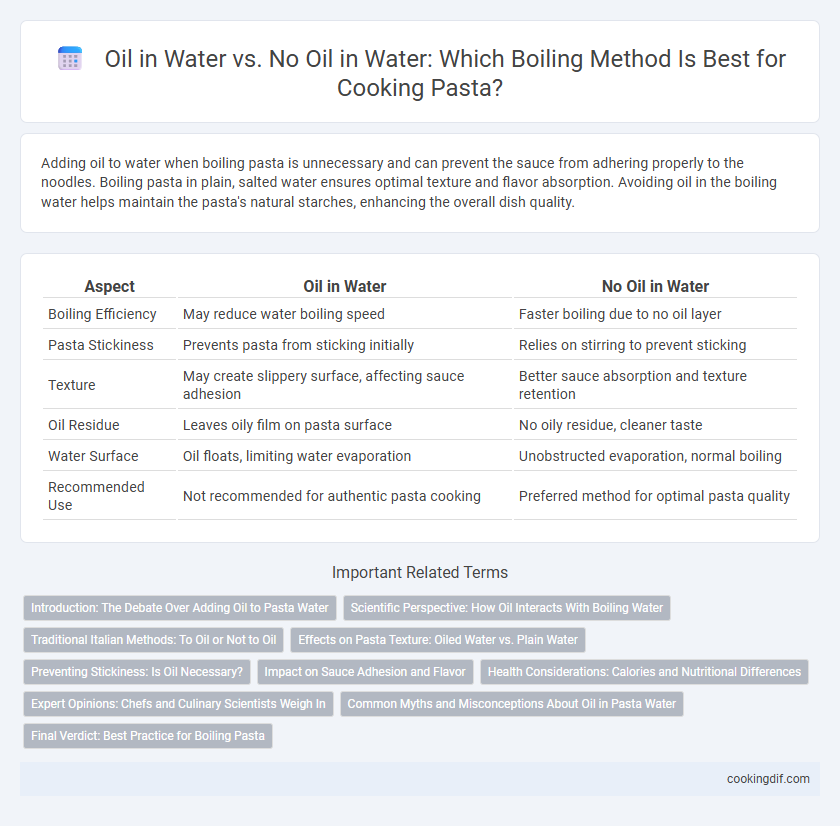Adding oil to water when boiling pasta is unnecessary and can prevent the sauce from adhering properly to the noodles. Boiling pasta in plain, salted water ensures optimal texture and flavor absorption. Avoiding oil in the boiling water helps maintain the pasta's natural starches, enhancing the overall dish quality.
Table of Comparison
| Aspect | Oil in Water | No Oil in Water |
|---|---|---|
| Boiling Efficiency | May reduce water boiling speed | Faster boiling due to no oil layer |
| Pasta Stickiness | Prevents pasta from sticking initially | Relies on stirring to prevent sticking |
| Texture | May create slippery surface, affecting sauce adhesion | Better sauce absorption and texture retention |
| Oil Residue | Leaves oily film on pasta surface | No oily residue, cleaner taste |
| Water Surface | Oil floats, limiting water evaporation | Unobstructed evaporation, normal boiling |
| Recommended Use | Not recommended for authentic pasta cooking | Preferred method for optimal pasta quality |
Introduction: The Debate Over Adding Oil to Pasta Water
Adding oil to pasta water is a debated cooking technique, with many chefs arguing it prevents the sauce from adhering to the pasta effectively. Scientific tests show that oil floats on the water's surface, minimally affecting the boiling process or pasta texture. Most culinary experts recommend skipping oil in the water and reserving it for finishing sauces to enhance flavor and texture.
Scientific Perspective: How Oil Interacts With Boiling Water
When oil is added to boiling water, it forms a hydrophobic layer on the surface due to the difference in polarity between oil and water molecules, preventing water from evaporating rapidly. This layer does not mix with the boiling water, which means the oil remains separate, making it ineffective for preventing pasta from sticking while cooking. Scientifically, the oil floats on top rather than integrating with the water, so it does not alter the water's boiling temperature or the pasta's cooking process.
Traditional Italian Methods: To Oil or Not to Oil
Traditional Italian pasta cooking methods emphasize boiling pasta in salted water without adding oil, as oil can prevent sauce from adhering properly to the noodles. The absence of oil allows the pasta's surface to remain starchy and absorbent, enhancing flavor integration during saucing. Studies show that adding oil creates a slippery barrier, reducing the pasta's ability to bind with traditional Italian sauces like marinara or carbonara.
Effects on Pasta Texture: Oiled Water vs. Plain Water
Adding oil to boiling water can create a slippery surface that prevents pasta from sticking but may also hinder the sauce from adhering effectively. Boiling pasta in plain water promotes proper starch release, enhancing texture and sauce absorption for a more cohesive dish. The choice between oiled and plain water directly impacts pasta's bite, stickiness, and overall mouthfeel.
Preventing Stickiness: Is Oil Necessary?
Adding oil to pasta boiling water is often debated for preventing stickiness, yet scientific consensus shows it is unnecessary; starch released by pasta during cooking causes stickiness, which is effectively managed by stirring the pasta frequently. Oil tends to float on top and does not prevent pasta from sticking together beneath the surface but can create a slippery layer that affects sauce adherence. Proper technique involves using ample water, continuous stirring, and promptly draining pasta to minimize stickiness without compromising texture or flavor.
Impact on Sauce Adhesion and Flavor
Adding oil to pasta boiling water creates a slick surface that hinders sauce adhesion, resulting in less flavorful bites. Without oil, pasta retains its natural starches, allowing sauces to cling better and deliver richer taste. The absence of oil ensures optimal sauce absorption, enhancing the overall texture and flavor profile of the dish.
Health Considerations: Calories and Nutritional Differences
Adding oil to pasta water does not significantly reduce calorie absorption but can create a slippery surface that prevents sauce adhesion, potentially leading to the need for more sauce and added calories. Boiling pasta without oil maintains its natural texture and preserves the nutritional profile without introducing extra fats or calories. Health-conscious cooking favors skipping oil in the boiling water to avoid unnecessary calorie intake and maintain the intended nutritional benefits of the pasta.
Expert Opinions: Chefs and Culinary Scientists Weigh In
Experts emphasize that adding oil to pasta water can hinder sauce adherence by creating a slippery surface on the noodles, which reduces flavor absorption. Culinary scientists highlight that oil does not prevent pasta from sticking; instead, vigorous stirring and using ample water are more effective techniques. Chefs generally agree that reserving some pasta water to adjust sauce consistency is a superior practice than adding oil to the boiling water.
Common Myths and Misconceptions About Oil in Pasta Water
Adding oil to pasta water is a common myth believed to prevent sticking, but it is ineffective because the oil separates and floats on top instead of mixing with the water. The proper technique to avoid sticking involves using ample water and stirring the pasta during the first few minutes of cooking. Contrary to misconception, oil in the water can hinder sauce adhesion by creating a slippery coating on the pasta surface.
Final Verdict: Best Practice for Boiling Pasta
Adding oil to boiling water for pasta is unnecessary and can prevent sauce from adhering properly, reducing flavor absorption. Cooking pasta in plain, salted water at a rolling boil ensures optimal texture and taste by allowing proper starch release and preventing clumping. For the best practice in boiling pasta, use abundant salted water without oil to achieve ideal cooking results and sauce compatibility.
Oil in water vs no oil in water for boiling method Infographic

 cookingdif.com
cookingdif.com